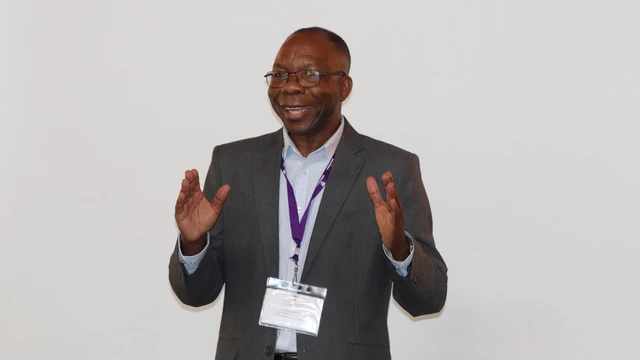
By Sinalo Thuku
Rhodes University hosted a symposium to reflect on the two decades since the Language Policy for Higher Education (LPHE) was adopted in 2002. The symposium presented and discussed efforts made and challenges encountered since the inception of the LPHE and how public higher institutions intend to respond to the imperatives of the new Language Policy Framework for Public Higher Education Institutions, which was promulgated in 2020 and became effective at the beginning of 2022. As part of compliance and accountability, public higher education institutions are required to align their institutional language policies with the framework, develop language policy implementation plans and submit an annual progress report to the Department of Higher Education and Training.
The two-day symposium held on 27 and 28 January at the Continuing Education Centre was organised by the National Research Foundation SARChI Chair for Intellectualisation of African Languages, Multilingualism, and Education, with colleagues in the African Language Studies of the School of Languages and Literatures, in collaboration with the Community of Practice for the Teaching and Learning of African Languages (CoPAL). The endeavour was to build on the work done by CoPAL, a community of practice established by Universities South Africa (USAf) to provide a platform for public universities to engage, share knowledge and concerns around the teaching of African languages and the implementation of institutional language policies that promote multilingualism.
The symposium consisted of speakers from different public higher education institutions who engaged in discussion about the language policy framework. Professor Dion Nkomo, Rhodes University’s African Languages Associate Professor, said the purpose of the symposium was to consolidate previous language policy debates and engagements ahead of the implementation of the new language policy framework under the guidance of CoPAL. “The new language policy framework has given more agency and urgency to the work done by CoPAL,” said Prof Nkomo. The debates held in the symposium contribute towards the advocacy of African Languages and sharing of good practices amongst different public higher institutions.
“The new policy will go on for the next five years,” said Elias Nyefolo Malete, an academic from the University of Free State’s Department of African Languages about the UFS language policy. Malete reflected on the work of the LPHE in the last 20 years and the implementation strategies of the new language framework. Malete said that there were efforts made to make sure that the new language policy framework reaches a new level of perfection. “The new policy is even better,” said Malete. However, even at this new level of perfection there still remains room for improvement. Malete said: “we also need to look at the new policy and improve on certain things.”
Director of the South African Centre for Digital Language Resources (SADiLaR), Professor Langa Khumalo, who concluded day two of the symposium with closing remarks from CoPAL. “We want to move the conversation beyond advocacy to creating real programmatic solutions,” Khumalo said. Along with understanding what the new language framework entails and its challenges of implementation, CoPAL wants to set clear guidelines so that higher institutions follow the instructions of the new framework. In light of this, Khumalo said that CoPAL in partnership with Rhodes University’s SARChI Chair will develop a book that is going to be instructive and give clear guidelines while also highlighting the challenges of the new language policy framework.
“We are not looking at those that are going to be making swift progress,” said Prof Khumalo. He said that going forward they are interested in how public universities will embrace the spirit and requirements of the new language policy framework and that no institutions should be left behind in the process. He called for unity amongst public higher education institutions as they make progress in initiating the new framework as this will be beneficial to the progress and advancement of African Languages in higher education.
For Rhodes University, Prof Nkomo indicated that he is already organising another event with colleagues at the Centre for Higher Education Research, Teaching and Learning and other academic departments to reflect deeply on how best the institution can respond to the new Language Policy Framework.
